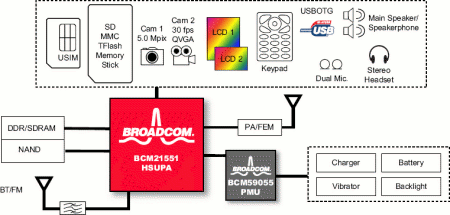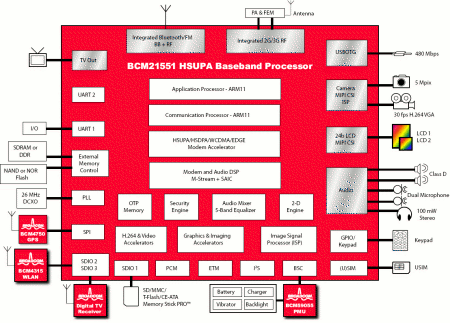Broadcom ships “3G phone on a chip”
Oct 16, 2007 — by LinuxDevices Staff — from the LinuxDevices Archive — 74 viewsBroadcom is continuing its push into the market for ARM-based mobile phone processors, with a newly shipping, sub-$25 “3G phone on a chip.” The BCM21551is built on 65nm technology and combines two ARM11 cores with HSPA (high-speed packet access) modem acceleration, multiple radios, 480Mbps USB, and on-die audio/video subsystems, according to the company.
digg this story |
Broadcom expects the new BCM21551 SoC's (system-on-chip's) extremely high level of integration to enable sleek new form-factors, longer battery life, and lower-cost, 3G-capable mobile phone designs, including both high-volume feature phones and higher-end smartphones running “open” OSes like Linux, Windows Mobile, or Symbian.
The chip is Broadcom's third highly integrated ARM-based mobile phone processor, following the single-ARM11 based BCM2153 HEDGE for EDGE networks and the original BCM2820, which used an external modem. Broadcom has also in the past shown off a Linux-based hardware/software reference design based on the BCM2153.
Broadcom claims the new BCM21551 integrates more radios than any other chip — evidence of the company's multi-modal CMOS RF technology leadership, it boasts. Along with two ARM11 cores — one for applications processing, and one for software-defined radio communications processing — the SoC integrates:
- Multi-band radio frequency (RF) transceiver
- Bluetooth 2.1 transceiver with enhanced data rate (EDR) technology
- FM radio receiver
- FM radio transmitter (for car stereo music playback)
Additionally, the chip can be combined with available Broadcom WiFi transceiver and GPS receiver chips, the company says. “Breakthrough” RF technology is said to eliminate the need for inter-stage filters, reducing cost and board space, the company claims.

Broadcom's notion of a “typical” BCM21551 implementation
(Click to enlarge)
The BCM21551 is primarily positioned for use with HSUPA networks, a variant of HSPA (high-speed packet access) said to support upload speeds up to 5.8Mbps, in addition to download speeds of 7.2Mbps. Broadcom claims that 900 million currently subscribe to HSPA networks, and that “many” network operators are “planning massive worldwide deployment” of HSUPA. HSPA succeeded UMTS (aka “3GSM”), which in turn succeeded GSM/GPRS.
In addition to HSPA/HSUPA, the BCM21551 reportedly can be programmed to support quad-band GSM, WCDMA, and several other protocols.
The BCM21551 is powered by a pair of ARM11 processor cores. The applications processor is said to run at 533MHz, while no clock speed was disclosed for the communications processor. The SoC also integrates a TeakLite-III DSP (digital signal processor) and various codecs and multimedia accelerators, including Broadcom's “M-Stream” QoS (quality-of-service) and “SAIC” (single antenna interference cancellation) processors.

Broadcom BCM21551 function block diagram
(Click to enlarge)
Additional touted features include:
- 5.0-Mpixel camera sensors with MIPI serial interface
- 30 fps full rate, H.264, MPEG4, H.263, and WMV9 at high quality VGA resolution
- H.264 encode and decode for best quality and memory usage
- Dual LCD support, up to 24M colors, with MIPI serial interface
- 64-tone polyphonic ringer
- Digital audio mixing and 5-band equalizer
- Codec support includes MP3, AAC, AAC+, eAAC, WMA, AMR-NB, and AMR-WB
- Integrated USB OTG HS (480 Mbps) and FS transceivers
- Integrated amplifiers for stereo headset and earpiece with stereo line drivers for external Class D loudspeaker amplifiers
- Stereo microphones for noise-cancellation applications
- Integrated stereo DACs claimed >95-dB SNR
- Integrated analog TV-out support (S-Video)
- Integrated RF transceiver
- Integrated BT 2.1 and FM RX and TX
- Self-calibrating 2G and 3G transceiver “automatically adjusts to changing conditions and compensates for manufacturing deviations”
- SD/MMC version 4.2 for support of external T-Flash/SD memory cards up to 32 GB
- 14 x 14mm 621-pin FBGA package
In a statement released by broadcom, Michael Thelander, CEO of Signals Research Group, commented, “Broadcom has already demonstrated commercial success with its EGPRS single-chip solution and multi-chip 3G solutions. With this single chip solution, Broadcom is becoming a one-stop supplier of 3G/2G, Wi-Fi, and Bluetooth silicon solutions and communications software, positioning it to leapfrog many of its competitors from both a technology and market share perspective.”
Yossi Cohen, GM of Broadcom's Mobile Platforms Group, stated, “With what we believe is more than a full year's lead over similar competing products, this new 3G solution should place Broadcom squarely at the head of the hyper-competitive 3G chip race. We built upon the success of our single-chip EDGE solution and merely eight months later our engineers not only built a single chip HSUPA solution, but also integrated Bluetooth, FM radio, and the next level of multimedia.”
Availability
The BCM21551 is available now to “early access customers,” priced at $23 in large quantities, according to the company.
Broadcom also recently shipped a highly integrated STB-on-a-chip, also using 65nm process technology. And, the large fabless semiconductor vendor recently joined the LiMo Foundation, a group of phone vendors and others collaborating on a common Linux kernel implementation for mobile phones.
This article was originally published on LinuxDevices.com and has been donated to the open source community by QuinStreet Inc. Please visit LinuxToday.com for up-to-date news and articles about Linux and open source.